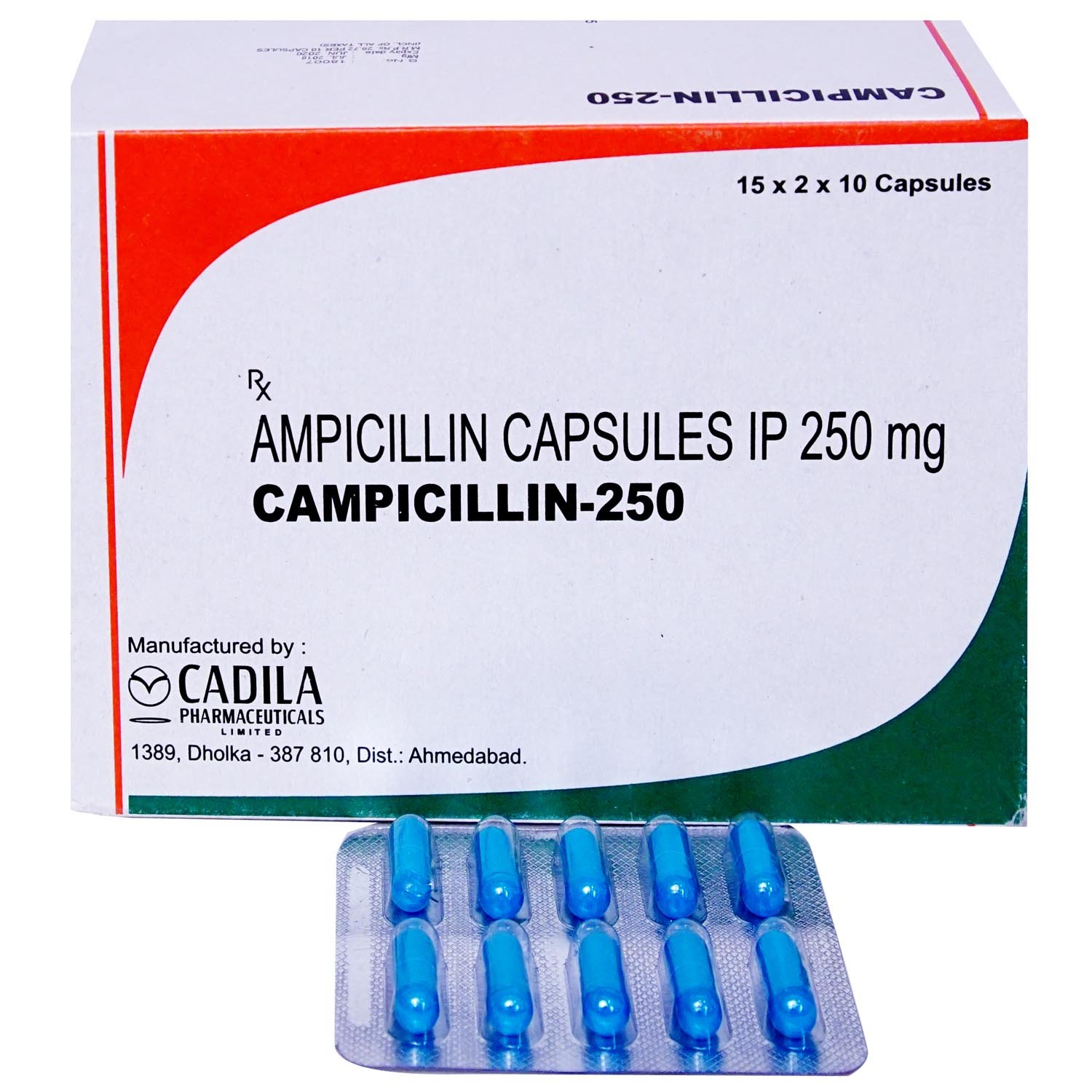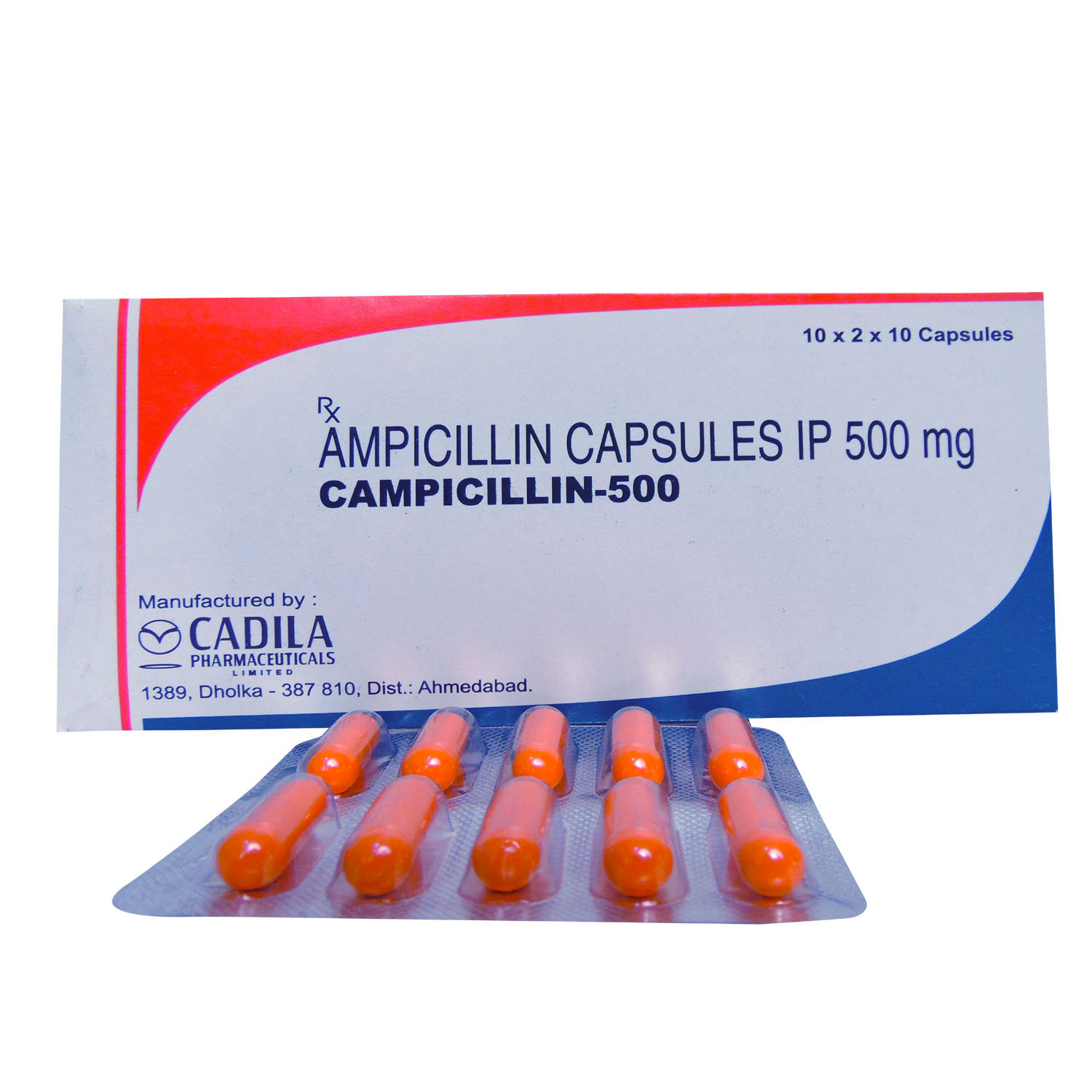Ampicillin
About Ampicillin
Ampicillin belongs to a class of medicines called penicillin antibiotics used to treat bacterial infections of the lungs, skin, stomach, and kidneys, as well as sexually transmitted infections like gonorrhoea. A bacterial infection occurs when harmful bacteria enter the body, multiply and cause infection. It can infect any part of the body and multiply very quickly.
Ampicillin contains Ampicillin, which works by inhibiting the process of bacterial cell wall synthesis that is required for its survival. Thus, Ampicillin kills bacteria and helps treat bacterial infection.
Ampicillin should be taken 30 minutes before food or 2 hours after food, on an empty stomach. Ampicillin may cause certain common side effects such as vomiting, nausea, and diarrhoea. Most of these side effects are mild and subside over time. However, if these persist, contact your doctor immediately.
Ampicillin should be avoided if you are allergic to any of its components. Inform your doctor if you have any kidney or liver problems. Pregnant and nursing mothers should consult a doctor before Ampicillin treatment. Birth control pills may not work effectively while using this medication. So, speak to your doctor about using non-hormonal birth control to avoid pregnancy.
Uses of Ampicillin
Medicinal Benefits
Ampicillin is a broad-spectrum penicillin antibiotic that is effective against a wide range of bacterial infections. Ampicillin kills the bacteria and prevents the growth of bacterial infection. It is used in the treatment of bacterial infections such as meningitis, kidney infections, gonorrhoea, pneumonia, or infections of the intestines or stomach.
Directions for Use
- Ampicillin can be taken on an empty stomach, at least 30 minutes before and 2 hours after food, as prescribed by your doctor.
- Follow your doctor's instructions on the dosage and timing of this medication to ensure safety.
- Swallow Ampicillin as a whole with a glass of water.
- Do not chew, crush, or break it.
Storage
Side Effects of Ampicillin
- Nausea
- Vomiting
- Stomach pain
- Diarrhoea
Drug Warnings
Inform your doctor immediately if you have any hypersensitive reactions, severe stomach pain, pale skin, or shortness of breath after taking Ampicillin. Let your doctor know if you ever have diabetes, asthma, kidney disease, or antibiotics-induced diarrhoea. This medicine may lower the efficiency of oral birth control pills or contraceptive devices. Ampicillin may alter test results with certain medical tests. Tell your doctor before undergoing those tests that you are using Ampicillin.
Drug Interactions
Drug-Drug Interaction: Ampicillin should not be given with Typhoid vaccine (live), cephalosporin antibiotics such as cefaclor, cefadroxil, cefazolin, cefixime, cefpodoxime, cefprozil, cephalexin; allopurinol/ probenecid (used to treat gout).
Drug-Food Interaction: Avoid consumption of alcohol while taking Ampicillin as it can cause serious side effects.
Drug-Disease Interaction: Ampicillin should not be used in patients with Renal dysfunction, colitis (inflammation of the colon) and hemodialysis.
Drug-Drug Interactions Checker List:
Safety Advice

Alcohol
cautionAvoid consumption of alcohol while taking treatment with Ampicillin.

Pregnancy
cautionAmpicillin should not be used when pregnancy unless clearly necessary. So, inform your doctor if you are pregnant or planning a pregnancy.

Breast Feeding
cautionConsult your doctor before taking Ampicillin; your doctor will decide whether Ampicillin can be taken by breastfeeding mothers or not.

Driving
safeIt is safe to drive a motor vehicle after using Ampicillin.

Liver
safe if prescribedAmpicillin can be safely used in case of liver disease if prescribed by your doctor.

Kidney
cautionAmpicillin should be used under caution in patients with kidney disease. Inform your doctor if you have kidney problems. Your doctor will prescribe only if the benefits outweigh the risks. If prescribed, the dose may be adjusted by your doctor based on your health condition.

Children
safe if prescribedAmpicillin can be given safely to children, dose to be adjusted and recommended by a child specialist only.
Habit Forming
Diet & Lifestyle Advise
- Diarrhea may happen as a side effect. Taking probiotics after completing treatment with Ampicillin may help. Talk to your doctor if you notice blood stools or develop stomach cramps.
- Drink plenty of fluids to avoid an upset stomach and hydrate your body.
- Avoid intake of alcoholic beverages with Ampicillin as it can make you dehydrated and may affect your sleep. This can make it harder for your body to aid the Ampicillin in fighting off infections.
- Maintain good hygiene and avoid contaminated or processed food.
- Include more fibre-enriched food like whole-grain bread and brown rice in your diet. These foods can be easily digested by your gut bacteria, which helps stimulate their growth.
- Avoid eating too many calcium-enriched foods and drinks as it might affect the working of Ampicillin.
Special Advise
- Even if you feel better after treatment with Ampicillin, do not stop taking it. This might cause the symptoms to reappear and will make the infection difficult to treat due to antibiotic resistance.
- Make sure you drink plenty of fluids when you are sick. This will, in general, help you clear out the infection faster, protect you from dehydration, and help you overcome some unpleasant side effects of taking Ampicillin.
- Stop taking Ampicillin and consult your doctor immediately if you develop any allergic reactions such as itching, skin rash, swelling of the face, throat, tongue, and breathing difficulties.
Patients Concern
Disease/Condition Glossary
Bacterial infections: A bacterial infection is a condition in which harmful bacteria enter, multiply, and infect the body. It can target any part of the body and multiply very quickly. When you get infected with bacteria, you can experience generalized symptoms like fevers, chills, and fatigue. Anyone can get a bacterial infection, but people with a weak immune system or taking immunosuppressive medicines like steroids are more prone to infections. Ampicillin does not work against infections caused by viruses, including cold and flu.
FAQs
Ampicillin is used to treat bacterial infections of the lungs, skin, stomach, kidneys, and sexually transmitted infections like gonorrhoea.
Ampicillin contains ampicillin, an antibiotic that works by interfering with the formation of the bacterial cell wall (a protective covering) that is necessary for their survival. Thereby damages the bacterial cell wall and kills bacteria.
No, this is an antibiotic medication. You need to complete the full course even if you start to feel better to prevent the return of infection and resistance to Ampicillin.
Ampicillin does not work against viral infection. So, it should not be taken to treat the common cold or cough. Consult your doctor if you have these symptoms.
Use of Ampicillin may lower the efficiency of birth control pills. Ask your doctor about using other contraception devices like diaphragm, condom, spermicide, copper T, etc with Ampicillin.
Ampicillin may cause diarrhoea as a common side effect. However, if the condition persists, worsens or if you notice blood or mucus in stools, avoid taking Ampicillin and consult a doctor immediately
The common side effects of Ampicillin include vomiting, nausea, and diarrhoea. Most of these side effects are mild and resolve over time. However, if they persist, please consult your doctor.
Yes, Ampicillin is an antibiotic medication used to treat bacterial infections. It belongs to a class of medicines called penicillin antibiotics and works by inhibiting the growth of bacteria.
Ampicillin may cause allergic reactions in some individuals in rare cases, including skin rashes, itching, facial or throat swelling, and breathing difficulties. Although rare, severe reactions like anaphylaxis may occur and require immediate medical attention.
Ampicillin usually starts to work within a few hours after taking it, but you should notice an improvement in symptoms within the first few days of treatment. Please consult your doctor if your symptoms do not improve or worsen after taking Ampicillin.
If you do not get better after using Ampicillin, it may indicate that the infection is resistant to the antibiotic, or there could be other complications. Please consult your doctor for further evaluation and possible alternative treatments.







